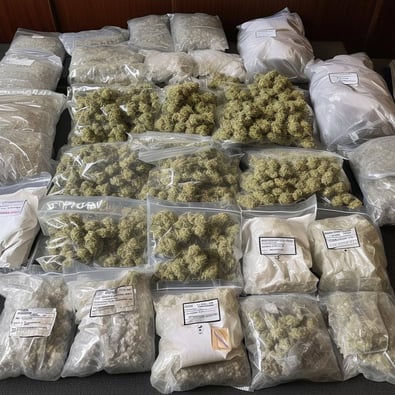Two drone operations delivered drugs into Pleasant Valley State Prison and the U.S. Penitentiary in Leavenworth.
Judging by the events of last week, drugs might be easier to find in prison than on the street. At least two major drone delivery operations flying drugs on demand into prisons were shut down by federal agents in the past week. Drones delivered not only weed, but spice/K2 drugs that mimic weed, butane oil, and an assortment of other drugs and contraband items.
The U.S. Attorney’s Office, Eastern District of California posted a press release on Thursday, announcing that four defendants have been indicted in schemes to deliver drugs into prisons via drone.
- Michael Ray Acosta, 48—already an inmate at Pleasant Valley State Prison—is charged with conspiracy to distribute drugs and will face federal racketeering charges.
- Jose Enrique Oropeza, 34, of Colton, California, is charged with conspiracy to own and operate an unregistered drone and several other charges.
- Rosendo Rene Ramirez, 34, of Sacramento, is charged with conspiracy to distribute drugs with an unregistered drone and several other charges, compounded by the use of firearms.
- David Ramirez Jr., 34, of Sacramento, is charged with conspiracy to distribute drugs and several other charges.
“According to court documents, between Jan. 1, and Dec. 10, 2021, Acosta used a contraband cellphone to coordinate multiple drone deliveries of contraband into Pleasant Valley State Prison and other prisons across the state,” the attorney’s office wrote, adding that the other three men operated the fleet of drones to deliver the drugs.
“Oropeza, Rosendo Ramirez, and David Ramirez Jr. flew drones over the prisons and dropped packages of contraband into the prisons. Acosta and his associates would then recover the contraband for further distribution throughout the prison population. The packages that Acosta helped to smuggle into the prisons included methamphetamine, heroin, cocaine, marijuana, cellphones, cellphone accessories, butane oil, and various other items.
If convicted of conspiracy charges, the defendants face a maximum statutory penalty of 10 years to life in prison and fines of up to $10 million. If convicted of possession with intent to distribute drugs, the defendants face a statutory penalty of five to 40 years in prison and a fine of up to $5 million. Since Rosendo Rene Ramirez is a felon and possessed a firearm, he faces additional charges that could tack on another 10 years and fines to his sentence.
More Drones Used to Deliver Drugs
Meanwhile, another team of criminals allegedly used drones to deliver drugs into the U.S. Penitentiary in Leavenworth. In this operation, six more were indicted on drug charges.
All six people face an assortment of conspiracy and drug possession charges. Dale Gaver III and Melvin Edwards—already in prison on other charges—allegedly arranged with four more people outside the prison to deliver drugs. Between August 2020 and May 2021, drugs on demand were available, and inmates into the prison yard could order specific drugs, The Wichita Eagle reports.
- Dale Gaver III, 35, originally of Omaha, Nebraska.
- Dale Gaver II, 54, originally of Omaha, Nebraska.
- Joshua Hamilton, 37, originally of Omaha, Nebraska.
- Rex Hill 33, of Riverside, California.
- Melvin Edwards, 44, of Riverside, California.
- Tamarae Hollman, 36, of Riverside, California.
This drone delivery operation involved men who allegedly delivered drugs into prison via drone, The Sacramento Bee reports. In this case, drones delivered spice/K2 drugs, marijuane, cigarettes, and cellphones into the prison.
This prison is especially notable because it housed the first people to be arrested for weed under the 1937 Marihuana Tax Act.
Court documents do not list the names of attorneys for the defendants.
For more Cannabis News like this, circle back to 420intel.com!
420 Intel News | 420 Advertising | Cannabis Business News | Medical Marijuana News | Recreational Marijuana News




